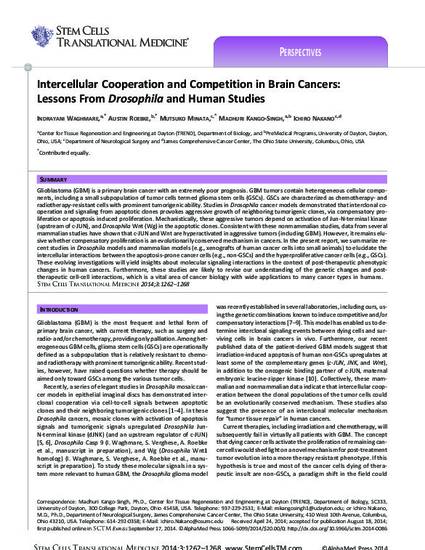
Glioblastoma (GBM) is a primary brain cancer with an extremely poor prognosis. GBM tumors contain heterogeneous cellular components, including a small subpopulation of tumor cells termed glioma stem cells (GSCs). GSCs are characterized as chemotherapy- and radiotherapy-resistant cells with prominent tumorigenic ability. Studies in Drosophila cancer models demonstrated that interclonal cooperation and signaling from apoptotic clones provokes aggressive growth of neighboring tumorigenic clones, via compensatory proliferation or apoptosis induced proliferation. Mechanistically, these aggressive tumors depend on activation of Jun-N-terminal kinase (upstream of c-JUN), and Drosophila Wnt (Wg) in the apoptotic clones. Consistent with these nonmammalian studies, data from several mammalian studies have shown that c-JUN and Wnt are hyperactivated in aggressive tumors (including GBM). However, it remains elusive whether compensatory proliferation is an evolutionarily conserved mechanism in cancers. In the present report, we summarize recent studies in Drosophila models and mammalian models (e.g., xenografts of human cancer cells into small animals) to elucidate the intercellular interactions between the apoptosis-prone cancer cells (e.g., non-GSCs) and the hyperproliferative cancer cells (e.g., GSCs). These evolving investigations will yield insights about molecular signaling interactions in the context of post-therapeutic phenotypic changes in human cancers. Furthermore, these studies are likely to revise our understanding of the genetic changes and post-therapeutic cell-cell interactions, which is a vital area of cancer biology with wide applications to many cancer types in humans.
Available at: http://works.bepress.com/madhuri_kango-singh/39/

This document has been made available for download in accordance with the publisher's open access policy. This document has been made available for use under a Creative Commons Attribution License.
Permission documentation on file.